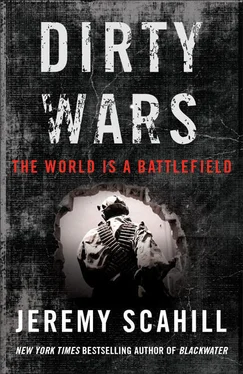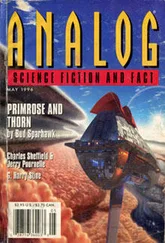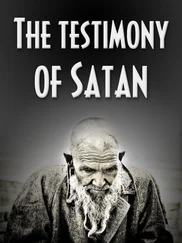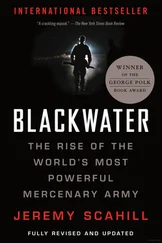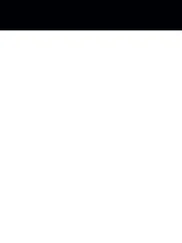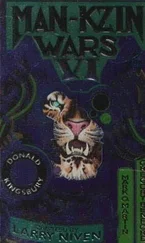Cambone’s right-hand man was a legend in the dark world of covert military operations, Major General William “Jerry” Boykin, an original member of Delta Force who went on to serve in both JSOC and the CIA. He’d spent his entire career in the shadows of US foreign policy, engaged in unattributable operations across the globe. As Boykin saw it, “Through the 1980s and 90s, SOFs saw great opportunities to get boots on the ground, to prepare the battleground, to shape the environment, and to collect intelligence” but only received “approval for less than 10 percent of the opportunities that existed.” These opportunities, he asserted, “were missed because of an unwillingness to take risks and a lack of vision and understanding of the benefits for preparing the battle space ahead of time. There was also a fear of consequences.” Boykin believed that US counterterrorism operations had become subservient to intelligence standards that required nearly 100 percent certainty of the target and that civilians would not be killed. He said he rejected the term “actionable intelligence.” “Give me action,” Boykin declared. “I will give you intelligence.”
Some, though, warned of the risks of this approach. Running US Special Operations Forces in CIA-type operations and “expanding their role in the way Rumsfeld intends could be very dangerous for U.S. foreign policy,” argued Jennifer Kibbe of the Brookings Institution, adding that using Special Ops Forces was “much easier than using the CIA. And this facility seems to appeal to Rumsfeld.” It meant that Special Operations “can conduct covert operations abroad without local governments’ permission and with little or no congressional oversight or recourse. If Rumsfeld gets his way, administration hawks may soon start using special forces to attack or undermine other regimes on Washington’s hit list.”
Over at the State Department, Powell and Wilkerson began seeing the effects of this new, parallel operation being run out of the Pentagon. “Early in the so-called ‘Global War on Terror,’ we were encountering things like ambassadors calling or e-mailing, or messaging or cabling, that they had people walking around their capital cities, who were white people, six foot five, males, nineteen-inch biceps, and it didn’t take too long for the ambassador to figure out who these people were, and why were they there,” recalled Wilkerson. “We began to have to press Rumsfeld as to what he was doing, sending these Special Operating Forces around the world, without alerting the country team, without alerting our ambassador, the chief of mission in the country. It got to the point where we actually had a death down in South America where one of these people got a little bit inebriated one night and pulled his weapon and he killed a taxi driver in that country, and we had to whip him out of the country real quickly.” Wilkerson added: “I am not even sure Rumsfeld knew some of the [operations] that the vice president’s office was” running.
“It grew and went out of control under the vice president. It kinda went wild,” Cannistraro, the former senior CIA officer, told me. “There were people at the Pentagon given the responsibility to run ‘special Special Operations,’ that didn’t go through the regular chain of command, and that were kept separate from coordination with CIA, or the State Department, or other elements of the US government. And that was all justified on the basis that 9/11 meant that we were in a war, and this war would require special measures to deal with. And it got out of control. There were a couple of places where, because they weren’t coordinated, they weren’t informed, they killed people that were not real targets. They were wrong.” He added, “It happened, frequently.”
The House Permanent Select Committee on Intelligence would eventually conclude that the Pentagon had “shown a propensity to apply the [Preparing the Battlespace] label where the slightest nexus of a theoretical, distant military operation might one day exist.” For some career army officers who had served in the conventional military, the developments they were witnessing inside the Pentagon felt ominous. “We know that the Geneva Convention was thrown under the bus, so to say, pretty early,” Colonel Douglas Macgregor told me. Macgregor was a decorated army officer who led the most famous tank battle of the 1991 Gulf War. He was on the Pentagon team that was charting out the early stages of Iraq War planning in 2001 and 2002. He said he was disturbed by what he was witnessing inside the DoD as Cheney and Rumsfeld began building up the SSB and JSOC. “To be perfectly blunt with you, I stayed away from it. I didn’t want to be involved in it, and I wasn’t interested in participating in it, because I had this fear that we were ultimately breaking laws,” he said. “Whether those laws were our own, or they turned out to be the Geneva Convention, or the ‘Law of War’ as we in uniform call it. One would have expected someone to stand up and say, ‘I’m sorry, Mr. Secretary, Mr. Cambone, General Boykin, you don’t have the authority to suspend the Geneva Convention. That has been ratified by the United States Senate.’ But, we have another problem. We have no interest in the Senate, in holding anyone accountable and enforcing the laws,” he asserted. “So if you have no one in any branch—whether it’s judicial, legislative or executive—who’s interested in upholding the law, then you can do pretty much what you want. And I think that’s ultimately what’s happened.”
Elsewhere in the military, there was great consternation at the possibilities for disaster presented by this newly forming power being asserted by Rumsfeld and Cheney and the global adventure they were plotting for US Special Operations Forces. “By entering the friendly country with military forces in execution of a military mission, the U.S. has committed an act of war even though our interest lies not with them but in the terrorist headquarters,” noted Colonel Kathryn Stone in a July 2003 report for the US Army War College:
Most of the world has come to look at CIA de facto wars as a way of life because most powers benefit from their own CIA-equivalents operating in foreign countries, with nothing to be gained politically by claiming an act of war when another’s covert action is discovered. The world, however, is not likely to tolerate the U.S. throwing its regular military muscle around in a covert fashion. The world will rightly ask: Where does it stop? If the U.S. employs SOF to conduct deniable covert action, then is the next step a clandestine tomahawk missile strike, or maybe even a missile strike whose origin is manipulated to conceal U.S. fingerprints?
Colonel Stone’s analysis would later prove prophetic, but such concerns were buried away. “I think a lot of ‘back-dooring’ went on and as a result they got a lot of running room. The President was kind of passive, in his first term he let them get away with a lot of stuff, and they had their own idea how to do things, which is much like the way the Israelis do things,” recalled Colonel Lang. “You know, the famous ‘Cheney one percent’ thing—if there’s any doubt, you kill ’em. That’s basically it, either capture them, or kill them. And that’s what they did for a long time.”
Rumsfeld and Cheney were beginning to build up the infrastructure for waging an unaccountable, global war—and JSOC would be their prized weapon. They needed a forward-leaning general to run their secret war. They would find their man in the form of General Stanley McChrystal, US Army Ranger.

9. The Troublemaker: Stanley McChrystal
THE UNITED STATES, 1974–2003; IRAQ, 2003—Stanley McChrystal was the son of an army general. He enrolled at West Point Military Academy in 1972, where he said he earned a reputation for being a “troublemaker.” He partied hard and seemed eager for action. One night, McChrystal and some friends staged a mock raid on one of the buildings on campus, using actual guns and balled-up socks as grenades. McChrystal was nearly shot by campus security and was later disciplined for his actions. A file full of disciplinary demerits, however, did not stand in the way of McChrystal making battalion commander. He graduated from West Point in 1976, finished Special Forces School at Fort Bragg in 1979 and commanded a Green Beret unit from 1979 to 1980, though he did not deploy during the most high-profile missions that were conducted during his early military career. “I missed Panama and Grenada and it bothered me,” McChrystal recalled. “You always wonder how you’ll do.” In the years following West Point, McChrystal pursued a dual track that would earn him a reputation for being a “warrior-scholar.” He picked up a master’s degree in national security and strategic studies from the US Naval War College and another in international relations from the Salve Regina University. McChrystal rose through the ranks of the Rangers and served with Airborne units as well as Special Forces.
Читать дальше
